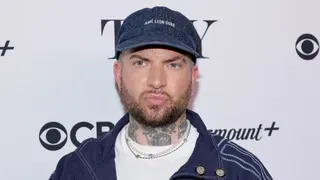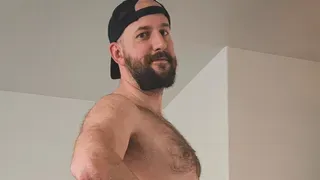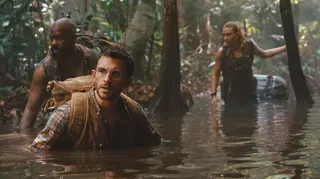April 30, 2013
The Skin He's In :: Broderick Fox on 'Body Media' and Big Tattoos
Kilian Melloy READ TIME: 17 MIN.
Documentary filmmaker Broderick Fox once ran the Boston Marathon as a "bandit" -- that is, an unofficial entrant who simply jumps in and runs with the crowd. "I came in at the tail of the pack," he told EDGE during a recent interview, only a couple of days after terrorists targeted the Boston Marathon.
"I wasn't officially enlisted, but in '95 I got it into my head that I would run it, so friends of mine and I joined on at the back of the pack," he explained.
Fox was an undergrad at Harvard, so he's familiar with Boston and its environs. Moreover, he has a sister who lives in the area with her family, so he keeps in touch with the city. Fox visited Boston, and his sister's home, while filming his new documentary, "The Skin I'm In," in which he turns his lens upon his own life, including his struggles with OCD, an eating disorder, cutting, and especially alcoholism. One of the film's most amusing scenes is set in his sister's back yard, as he's fumbling with how to break the news to his mother that he's planning to get a massive, complex tattoo on his back.
The film is an entry in what Fox calls "Body Media." The story of the tattoo turns out to be meaningful on several levels in and of itself, but the way it ties into the story of his life proves fascinating, moving, and intricate.
"I've made a couple shorts that are autobiographical," Fox noted. "In 2000 I made a piece with one of the first consumer digital video cameras, called 'Things Girls Do,' which addressed questions of body dysmorphia and eating disorders.
"That piece is a trick film in a way; it starts in a domestic space with a woman's voice, and you think you're hearing a familiar trope of a young woman dealing with an eating disorder, and then through the course of the film the voice modulates into my own voice. I think people take it to be a formal expression of this girl's life slowing down and falling apart, but at the end, I'm on screen. It's a coming out as a guy who's been dealing with eating disorders.
"That started my journey into what I might call Body Genres, or maybe Body Media," Fox continued, "where I use my own body and personal stories as a way to get at larger, more complex cultural questions, particularly around gender and sexuality. I was inspired by a lot of queer and feminist video makers of the '80s and '90s, who put their own identities and bodies on the line.
"With this piece, I'm asking what space those personal stories have for larger social questioning in a time where everybody, now, is confessing and exposing themselves online [and in other media] on a daily basis."
To this viewer, the film implied the existence for what might be thought of as the several stages of gay self-acceptance. Fox documents his early life experiences with OCD, anorexia, cutting, role-playing, alcoholism, and a crisis in which he ended up dead drunk on the tracks of a Berlin subway station with a head injury. All of that despite being, as he terms it himself, "an extremely high-functioning member of society."
His highs and lows notwithstanding, Fox keeps things in perspective. "I'll say that there really is nothing extraordinary or special about my story," he reckoned, "but I think there is an exciting possibility for all of us to tell our stories in fresh ways using the tools we now have at our disposal.
"This film was shot on a dizzying array of consumer (or what you might call 'prosumer') video formats that evolved as the film progressed and as the technology progressed," he added. "I'm coming from an incredible place of privilege on a lot of levels, having access to those cameras and an editing system, and even growing up with a sense that my voice mattered and I should feel empowered to speak for myself. As I teach and work with young people, I see that's not always a given."
Even so, "I think that particularly in Western cultures, everybody needs to go on their own journey, and there is a general theme of people going inwards and scrutinizing and attacking the self as they try to figure out their own place within the culture that will hopefully resonate with a wide range of audience members, regardless of their own identity."
In the film, Fox describes a childhood spent traveling the world, his camera in his hand; even then he was documenting his voyages. But curiously, it was only upon his return to the United States that he felt himself to be a foreigner.
"I think a lot of that discomfort at that young age came from my burgeoning sexuality," Fox reflected. "I think the culture is changing now in a lot of exciting ways, but I think for people coming out before the Internet, that was a different time and it was more difficult actually to find community as a young person, or to find more complex representations of what it is to be gay.
"I remember running home at three o'clock in the afternoon and turning on Oprah Winfrey or Phil Donahue when they had gay guests on, and absorbing that and trying to process it -- but also listening for whether my parents were coming home so I could turn off the television quickly. Just searching for those crumbs of information... And the AIDS crisis reached a peak around then, too. A lot of the people I now see as heroes, like the ACT-UP activists, people whose efforts I teach about now in class, some of that more agit-prop, performative protest stuff, kind of struck me as scary... at least, the way it was presented on the ten o'clock news. I was a young person trying to figure out where I fit within all of that.
"It's easy to sort of bash the United States, but being a U.S. citizen, being able to ask these sorts of questions in a film, working in a place where I can screen this movie to my peers and to my students and still have a job... I am privileged on so many levels," Fox noted. "But having spent a lot of time in Europe, Australia, and Asia, I think the myth of the American Dream is a tricky one in that we get the sense that we're free and living in the Land of Opportunity, and yet in many respects we're left on our own. There really isn't much of a social safety net, and so I think people get very fearful, and that does make them, ironically for the 'freest place on Earth,' susceptible to dogma because they're looking for a sense of direction and some sort of sense of security and stability. People default sometimes to institutions such as religion. In the end, I think this is a really fear-based culture."
So what's a smart, curious guy to do in a culture that celebrates the individual and yet often defines itself according to institutions that tend to insist upon homogeneity?
"I say this at the end of the movie, but everything I've come to know as a truth in my life has been verified through experience, having to go through it for better or worse," Fox reflected. "I've had to measure things for myself, rather than take anything as a given.
"I wouldn't want to go through some of that stuff again, but I think that ultimately it was a gift. I wish our culture fostered more opportunities for people to go on those personal journeys of questioning," the filmmaker added. "If you look at all of the behaviors I went through, they are all symptomatic of looking externally, or looking to the outside to fix something that required me to look inside.
"Unless you do the personal work and figure things out for yourself, the same problems are going to come up and keep manifesting in different ways for the rest of your life. I'm certainly not immune to them now, but I am able to identify the patterns earlier and work through my part in them more quickly."
Fox's film traces a journey that passes through many phases and periods of transformation. The incident in Berlin, however, seems to mean something more; in a way, it's a rebirth.
"I certainly seized upon it as a rebirth," Fox agreed. "I suppose I could have interpreted that experience in a lot of different ways and made a lot of different choices from it. I needed something to change in my life, and after living through the shame of realizing this wasn't something that just affected me personally but also affected complete strangers, who were put into incredibly compromising, dangerous situations to help me, and did so... it was very humbling. I felt that I owed it to them, and certainly to myself, to try another tack.
"I know other people in my life who have issues with alcohol or other 'isms,' who haven't had that pronounced of a bottoming out," Fox continued.
"Having something that traumatic, or that climactic, happen is somewhat of a gift because it really does put into motion an expedited growth, whereas left to general dis-ease and states of malcontent for long stretches of time, people can just go on in these same patterns. A fate worse than death would have been for me to have stayed a disconnected, dissatisfied drunk for the rest of my life."
The GLBT community has faced some tough struggles for acceptance and equality. But the harder struggle may be that one that any minority, or any outsider, has to engage with internally. Fox underscores this in his film by using trick photography to appear both as himself and as certain other people in his visual descriptions of episodes from his past.
"In a way they are re-enactments," Fox allowed, "but those moments go beyond your autobiography. Partly, [the use of trick photography] is out of necessity: How do you represent events that you don't have the footage for? But then those kinds of strategies can also work on metaphorical and playful levels.
"Being able to literally step into someone else's shoes -- to experience the day after the accident, at the hospital, as my partner at the time; to put that shoe on my own foot, and really experience those things -- allows for a connection or engagement with those people's experiences as well. It's bridging the gap between myself and others."
It's not just the experience of others Fox depicts in appearing as different characters from his life story. He also depicts the various personae that constitute the cumulative phenomenon of his own identity. These personae include Rick, a go-go dancer who likes to give erotic haircuts; Dina, a self-possessed woman who, unlike Fox as his usual self, has no problem letting her feelings be known; Dr. Fox, an accomplished academic; and Brody Fox the artist.
These are not distinct personalities a la "Sybil," but they are distinct parts of Fox's own psyche, and he explores them with the same open-eyed curiosity as an artist explores anything beautiful or fascinating. Eventually, all of these personae occupy the frame, a veritable little village that makes for an individual who finally finds a kind of healthy personal integrity in bringing them all together.
"That was an idea I'd had for a while," Fox commented. "In some ways, the film is quite traditional in its documentary approach: It's driven by talking-head interviews and a voice that narrates the story."
But at the same time as he observes the standard documentary format, "I wanted to challenge that idea of the expert in a documentary, and also the Western notion of the singular self," Fox said. "I chose to divide my life up in these four or five major, distinct performances that all reflect people that I am, and people that I perform regularly in my life. I have a sense that anyone could divide himself into different selves," Fox added, "a different self for every sort of personal and professional interaction. I imagine I could have split myself up in different ways than I did.
"There's playfulness and also historical accuracy to this approach: Each of these characters do exist, and they interacted with the world in the way you see on the screen. It's their clothing they're wearing on the screen, not costumes." The approach, Fox added, follows from "an idea from queer theory that life itself is a performance."
What ties all of this together is the unifying story of the tattoo, the design for which Fox commissioned from Canadian artist Rande Cook. The work of inking the design onto Fox was done by Los Angeles tattoo artist Zulu and the tattoo, in turn, symbolizes the integration of Fox's life -- the unique life that he lives within his own skin. The tattoo not only celebrates this internal unity, but symbolizes it and completes Fox's journey to wholeness. The tattoo may exist on Fox's body, but it speaks most profoundly to his soul.
"Intuitively, I reached out to others to help me rediscover a sense of spirit, to reconnect with myself and construct some sort of contemporary rite of passage for myself," Fox noted. "There are so many cultures that build rites of passage into various aspects human life, and American culture doesn't have that.
"The world looks to us for our pop culture, but in terms of my own experience I didn't really find anything in the post-modern, media-saturated American mode of existence that I saw as a path for some sort of innate sense of coming of age," Fox added. "At age 30, I kind of looked outward and tried to create that process for myself. As a critical scholar I recognize that from the outside this process could be seen as very California-New-Agey, or it could be seen a form of colonialism to appropriate indigenous traditions and put them onto my own body. But I think that experience of working with Rande and working with Zulu, and my ongoing friendship with Rande in particular, can maybe speak to a new possibility on the flipside of globalization. The connectivity of the world can enrich us; the variables that we choose to draw from in defining ourselves and finding our paths can be a bit more diverse now, and for somebody who was isolated in his own head with alcohol and a range of other behaviors, this journey wasn't one I could have done alone. It caused me to get into community and collaboration with people outside of my own identity and that process was incredible transformative and had enduring effects."
Was Fox suggesting, perhaps, that the GLBT community (or even the mainstream community) needs some sort of shamanistic, ritual guidance or spiritual mentoring?
"I think so; this is where I would love to hear from LGBT audience members," Fox reflected. "I distrusted organized religion from an early age and rejected it, but in doing so I rejected any sort of real exploration of spirituality and I don't think that's an uncommon thing. There's that question of how can queer people really still make sure that they are tapping into spiritual traditions beyond self, beyond ego, beyond material possessions, beyond political struggles. It goes back to what we were talking about before -- unless you are finding something within yourself and beyond yourself, you're going to have a pretty bumpy road. I don't know that spirituality is something that gets talked about a lot in gay politics."
That line of thought is reminiscent of Zulu's explanation, as he works the needle and gradually brings the tattoo to completion, that Zulu sees himself not as applying (or imposing) anything on Fox; rather, he sees his role as bringing something out of Fox that already resides within him. Zulu simply makes it visible. And it seems more than mere coincidence that after the tattoo's completion, at a time when he wasn't even looking for it, Fox found a loving life partner.
"I think there's definitely some truth to that," Fox said. "I remember waking up one morning about a year and a half after all this, after finishing up the tattoo and thinking to myself, 'Something's gone in my gut. Something feels different. What is it? Is something good happening today? Did I forget something?' And then I realized it was that the physiological, gut-clutching sense of having a secret, or carrying shame, was gone. I realized that sensation had been constant for me my entire life; that place in my stomach where the 'Oh, I'm gay, how am I gonna tell my family, I don't know how they are going to react' thing was gone.
"It literally changed my body's energy to be free of all the lies I carried -- before I was out, while I was an alcoholic and playing around with these different personas, and having multiple cell phones to keep up with Rick and the things I got up to in that guise... It was always something in my gut that kept me from being at peace, and I suddenly realized there was nothing there to fret over in my essential nature," Fox said. "It was such an incredible sense of peace that I hadn't experienced before, and I don't know that many people ever get there. Just arriving at that state, I was so grateful that I wasn't worried about whether I was partnered or single for the rest of my life. And then love came! I think being in that state allowed me to recognize love and receive it, and reciprocate it also."
After such profound life transformations, what could Fox have in mind for his next project?
As it turns out, Fox has his next film in the can already, and is preparing to put it together in the editing room over the summer. The new project is something both very different, and yet in line with the overall concept of a life lived with healthful integrity.
"My engagement with issues like gender and sexuality have now progressed to people who are using video to deal with illness and death and dying," Fox told EDGE. "I've written about that extensively, and when I went to premiere 'The Skin I'm In' at a festival in Australia, I met a woman in the audience, Zenith Virago, who calls herself a 'death walker.' She's part of a 'natural death care' movement, and she helps people with practical, legal, and emotional support around end-of-life decision-making.
"It's not euthanasia," Fox clarified. "It's really just dying at home, eco-burial options, more generally trying to bring the issue of death and dying back into community and back into culture, rather than it being this thing that we need to leave to professionals and take out of visibility.
"She happens to be a queer woman too, so I guess it's still kind of a gay film," Fox noted. "The film is called 'Zen and the Art of Dying.' Hopefully it'll be done next year."
"The Skin I'm In" will close out its festival journey with a May 3 screening at the Miami Gay & Lesbian Film Festival and a May 26th screening as part of Fairytales in Calgary, Canada. The DVD and digital release of "The Skin I'm In" is slated for July 1. Details available at skiniminmovie.com
Kilian Melloy serves as EDGE Media Network's Associate Arts Editor and Staff Contributor. His professional memberships include the National Lesbian & Gay Journalists Association, the Boston Online Film Critics Association, The Gay and Lesbian Entertainment Critics Association, and the Boston Theater Critics Association's Elliot Norton Awards Committee.





